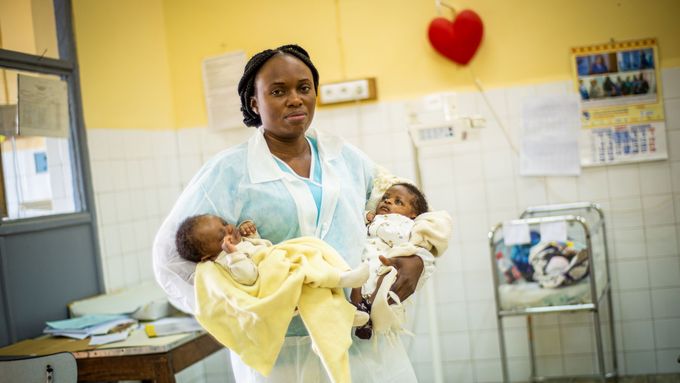Novartis and Medicines for Malaria Venture (MMV) announce positive data from their phase II/III CALINA study, demonstrating that a novel formulation of Coartem® (artemether-lumefantrine) developed for babies weighing less than 5kg with malaria has the required pharmacokinetic profile and good efficacy and safety. The trial was conducted in several African countries. Swiss TPH was in charge of carrying out the study in the Democratic Republic of the Congo.

Current antimalarials have not been developed specifically for infants weighing under 5 kg. (Photo: Fairpicture/Swiss TPH)
Malaria exerts a massive burden on public health across the world, particularly in Africa. Huge strides have been made in recent decades in the treatment of malaria. However, to date, little data has been generated in the smallest children – babies less than 5 kg.
Closing the malaria treatment gap
The CALINA study is led by Novartis, with the scientific and financial support of Medicines for Malaria Venture (MMV), and as part of the PAMAfrica consortium, which is funded by the European & Developing Countries Clinical Trials Partnership (EDCTP2). It is the first evidence-based trial conducted to evaluate a new antimalarial dose and regimen for all infants weighing under 5 kg with acute uncomplicated malaria. If approved, Novartis and MMV aim to make the treatment available as soon as possible to the youngest infants, who currently lack access to evidence-based treatment options.
The new formulation, known as Coartem <5 kg Baby, uses a new ratio and dose of artemether-lumefantrine to account for metabolic differences in babies under 5kg. Infants under 5 kg can be affected by placental malaria, leading to poor birth outcomes, or contract malaria from the bite of an infected mosquito. The prevalence of the disease in this age and weight group is poorly understood, and it is therefore often misdiagnosed.
Current antimalarials have not been developed specifically for infants weighing under 5 kg. There is no approved treatment available for them, and they are treated with tablets meant for children above 5 kg adjusted by weight. Yet, these tiny patients handle drugs differently due to the immaturity of their metabolizing organs, which can lead to overdose and toxicity. Coartem <5 kg Baby provides optimized dosing specifically tailored to the needs of these vulnerable patients. If approved, the treatment will close a significant treatment gap.
A trusted partner for clinical trials
The Democratic Republic of the Congo (DRC) recruited many of the study participants and Swiss TPH as external service provider set up the trial site, and managed and monitored the trial. “Setting up such study sites to test drugs for poverty-related diseases is something Swiss TPH has been doing for over 20 years in partnership with different organisations and countries”, said Elisabeth Reus, Head of the Clinical Operations Unit at Swiss TPH. “Children bear the greatest burden of malaria and it is essential that especially the youngest have access to medicines that are safe to use and tailored to their needs. This study demonstrated a successful public/private partnership and what is possible.”
Longstanding partnership in DRC
Swiss TPH has been present in the DRC for over twenty years and has played an active role in several clinical trials. The portfolio of past and present projects in the DRC includes epidemiological research, capacity strengthening activities in public health and malaria, and clinical trials on human African trypanosomiasis (sleeping sickness) and malaria in both paediatric and adult populations.
